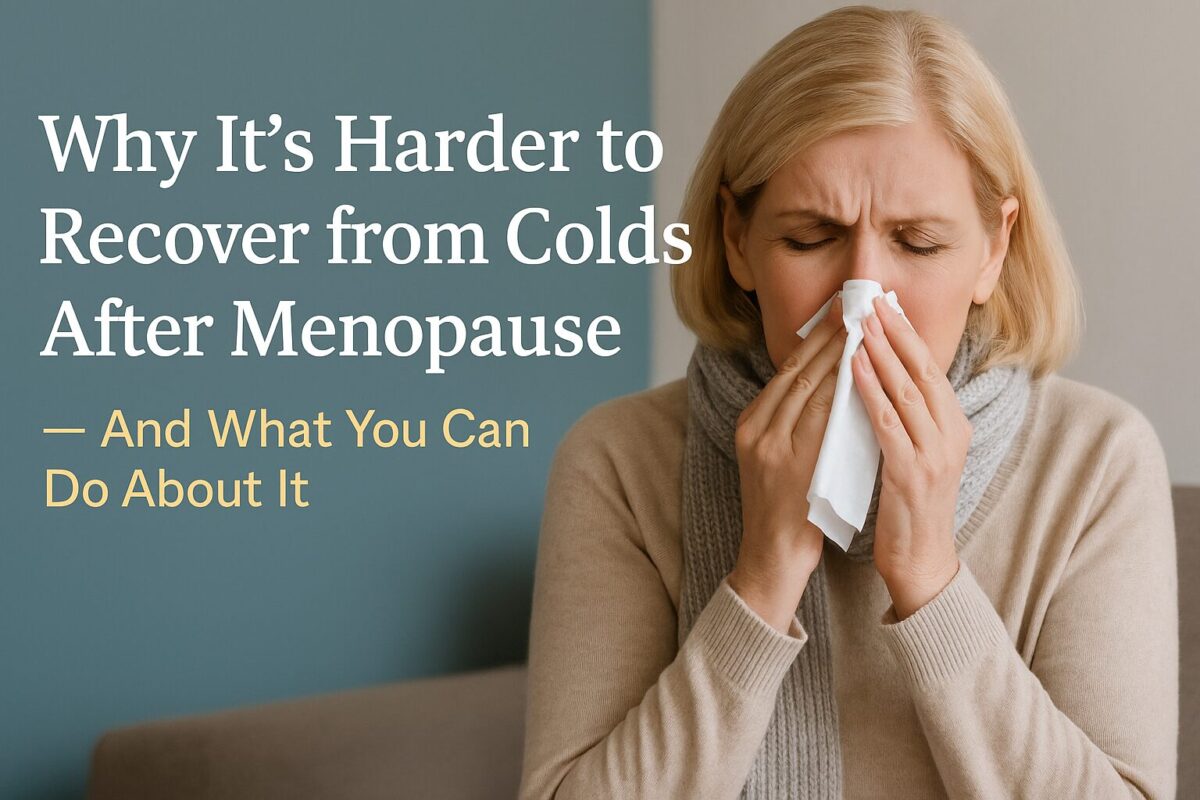Many women notice something frustrating after menopause: catching a cold becomes more frequent, and recovery takes longer than it used to. This isn’t just aging — your body’s immune system changes dramatically after menopause. But the good news is that you can take simple, natural steps to support your immune health and bounce back faster.
Let’s explore why colds linger after menopause and how to restore your resilience using both science and traditional Japanese wellness principles.
How Hormonal Changes After Menopause Affect Your Immune System
Estrogen’s Role in Immune Defense
Estrogen isn’t just about reproduction. It plays a key role in regulating the immune system. Before menopause, estrogen helps your body respond quickly to viruses and reduces inflammation. Once estrogen declines, your immune response slows down.
Studies show that postmenopausal women often have higher levels of pro-inflammatory markers, making it harder to fight off infections and recover quickly. [source]
Why Inflammation Becomes a Bigger Problem
Lower estrogen can also lead to chronic low-grade inflammation, sometimes called “inflammaging.” This makes your body more vulnerable to seasonal stress, allergens, and even mild infections like the common cold.
Why Recovery from Common Colds Takes Longer in Your 50s and Beyond
Aging Slows Cell Repair
As we age, our cells regenerate more slowly. This means that the tissues in your throat, sinuses, and lungs — all affected by a cold — take longer to heal. You may also feel more fatigued for days after symptoms begin to fade.
Immune Memory Weakens
Another reason colds last longer after 50 is the weakening of immune memory. Your body becomes less efficient at recognizing and responding to viruses it has seen before. This makes each cold feel almost like a new infection.
Related Reading:
The Hidden Link Between DHEA Decline and Lower Immunity
What Is DHEA?
DHEA (dehydroepiandrosterone) is a hormone your body uses to produce estrogen and other important hormones. After menopause, DHEA production drops significantly — often by up to 80% compared to your younger years.
Why DHEA Matters for Your Immune System
DHEA has strong anti-inflammatory and immune-supporting effects. Its decline contributes to weaker resistance against seasonal colds. One study even linked low DHEA levels to increased respiratory infections in older adults. [source]
A Natural Way to Support DHEA
Japanese women traditionally consume fermented soy foods like miso and natto, rich in aglycone isoflavones that help support natural hormone balance. Effisoy®, a supplement inspired by this dietary habit, uses fermented soy isoflavones to help your body naturally produce more DHEA — without synthetic hormones.
Related Reading:
Natural Ways to Strengthen Immunity After Menopause
Eat Anti-Inflammatory Foods
Focus on whole, colorful foods — especially those rich in antioxidants and phytonutrients. Japanese staples like mushrooms, seaweed, green tea, and fermented soy can help fight inflammation and support immunity.
-
Try miso soup with wakame seaweed and tofu
-
Add shiitake mushrooms to soups or stir-fries
-
Snack on a small handful of mandarin slices (rich in beta-cryptoxanthin)
Related Reading:
Get Quality Sleep
Poor sleep weakens your immune system. Women over 50 often experience sleep disruptions due to hot flashes or anxiety. Establish a calming bedtime routine and avoid screens an hour before bed.
Stay Physically Active
Moderate, regular exercise (like brisk walking or gentle yoga) boosts circulation, promotes detoxification, and strengthens immune function.
How Japanese Wellness Traditions Can Support Seasonal Health
Daily Habits That Build Resilience
In Japan, people often follow simple lifestyle routines that promote year-round health:
-
Warm breakfasts like miso soup help maintain body temperature
-
Seasonal eating ensures a variety of nutrients
-
Gentle movement, like walking to the market or practicing radio calisthenics, keeps the body active
These practices don’t just prevent colds — they build a foundation of resilience and balance.
Supplementing with Tradition in Mind
Juveriente’s supplements reflect these time-tested habits. Whether it’s Effisoy® supporting hormonal balance, or Bone Strength Complex with mandarin extract for cellular health, the goal is simple: helping your body return to its natural strength.
Conclusion
It’s true: recovering from colds becomes harder after menopause. But you don’t have to accept it as your new normal. By understanding the hormonal shifts involved and supporting your immune system through nutrition, sleep, and traditional Japanese wellness habits, you can stay healthier through every season.
Want to learn more about how Japanese health wisdom can help you thrive? Explore our full blog library for natural tips and product insights.
Related Reading:



